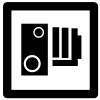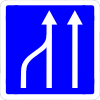Key:type
(Redirected from Types of relations)
Jump to navigation
Jump to search
| Description |
|---|
| Type of a relation. |
| Group: properties |
| Used on these elements |
| Documented values: 17 |
| Status: de facto |
| Tools for this tag |
|
type=* on a relation object specifies its type and interactions among its members. Established and proposed relation types are listed below.
type has been also occasionally used as an add-on tag to specify a "variant" of a feature category on ways and points. This approach conflicts with its use in relations and should be avoided. Also, for elements with multiple tags, it is not clear to which tag the type refers to. Instead, use suffix-based or subtag-based approach, as described in *:type=*.
Established relations
| Type | Status | Members | Comment | Statistics | Image |
|---|---|---|---|---|---|
| multipolygon | de facto | Areas where the outline consists of multiple ways, or that have holes. | |||
| route | de facto | An established (often signposted) route over multiple highways for a given transport mode (hiking, cycling, bus or motorized traffic) | |||
| route_master | approved | Contains closely related (parallel, opposite, variant, ...) routes only; heavily used to group route variants in public transport. | |||
| restriction | de facto | Permitted turns on a highway junction. | |||
| boundary | de facto | Political, administrative and similar boundaries not always observable on the ground. Defined in similar manner as multipolygons. | |||
| public_transport | approved | Part of the OSM public transport scheme. Mainly used by public_transport=stop_area. | |||
| destination_sign | approved | Destination signs at or before intersections. | |||
| waterway | approved | Groups multiple segments of a named waterway=*. | |||
| enforcement | approved | Traffic enforcement devices; speed cameras, redlight cameras, weight checks, ... | |||
| connectivity | approved | Indicates how the lanes in the "from" member connect to those in the "to" member. |
Uncommon relations
| Type | Status | Members | Comment | Statistics | Image |
|---|---|---|---|---|---|
| associatedStreet | controversial | House numbers related to a street. See Karlsruhe scheme proposal. Banned by community in a few countries. | |||
| superroute | controversial | Groups together a string of routes. Superroute contains (concatenable) routes only. Its usefulness is disputed. | |||
| site | in use | Groups elements of a "site" with node members, instead of using a multipolygon. See Relations/Proposed/Site | |||
| network | in use | Relations that describe networks with their members being the members of this network. | |||
| building | in use | Sometimes used to group elements that form a building in simple 3D modelling, but not usually required. | |||
| multilinestring | in use | A discontiguous series of unclosed ways that semantically represents a single physical object. | |||
| street | proposed | Bind all parts of a street together and everything else that belongs to it. See Relations/Proposed/Street | |||
| bridge | proposed | Groups together all elements of one bridge. See Relations/Proposed/Bridges and Tunnels | |||
| tunnel | proposed | Groups together all elements of one tunnel. See Relations/Proposed/Bridges and Tunnels | |||
| user defined | All commonly used values according to Taginfo | Taginfo |
Proposed uses
Abandoned and obsolete proposals not included.
Junctions, intersections, grade separated crossings, and embankments
- Relations/Proposed/Bridges and Tunnels
- grouping all ways using a common bridge or tunnel
- Relations/Proposed/Junctions
- all the ways that make up a junction (such as a motorway intersection)
- Relations/Proposed/Turn hints
- Hints for whether a turn is a slight left, sharp left, fork, etc.
- Relations/Proposed/turn lanes
- which turns are allowed from a given lane
Area hierarchies and other relations for areas
- Relations/Proposed/Area
- to define areas between ways and lanes (linear crossover), virtual and physical dividers and crossover-possibilities, etc.
- Relations/Proposed/Label
- Manually placed labels or icons in areas
- Relations/Proposed/Level
- For floors in 3D-Objects (Subway stations, buildings, etc.).
- Relations/Proposed/Sled
- for grouping together all relevant items of a sled run.
Addressing
- Relations/Proposed/Cluster
- for grouping features with a collective name or address etc.
- Karlsruhe Schema
- Relations/Proposed/Postal Addresses
Others
- Relations/Proposed/Defaults
- defines a set of default values (speed limits, oneways, access) for a country, a state
- Relations/Proposed/Provides feature
- to associate an object such as a restaurant, hotel or museum with one or more map features such as addresses or entrances.
- Proposed_features/Group_Relation
- a relation to create groups of objects (e.g. when they have a common name as group) without requiring additional tags (they are defined through their members).
- Relations/Proposed/Node
- a relation to have several node objects at the same location without adding actual geometry objects (e.g. for things attached to a pole, antennas on a mast, etc.)
Possible tagging mistakes
See also
- *:type=*












